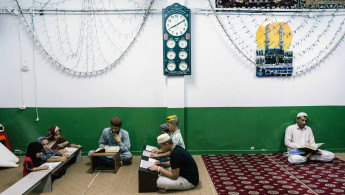'Makeshift mosques' set stage for worship in Athens
The Athens neighbourhood of Votanikos is lonely these days. Abandoned old warehouses have been left untouched since the financial crisis struck mercilessly in 2008. Smoke from a dusty road and neglected stray dogs are the only inhabitants of the area.
"Orthodoxy - not mosque," is scrawled on a wall here, some recent vandalism by one pf the far-right groups opposing the construction of the Temenos mosque. It will be the first mosque in 180 years in Athens - the last European capital without an official centre for Muslims to pray.
"The work started in November. So you can't enter. The area is now fully under control of a private construction company," a young policewoman told The New Arab when we approached the entrance of what was once a military base.
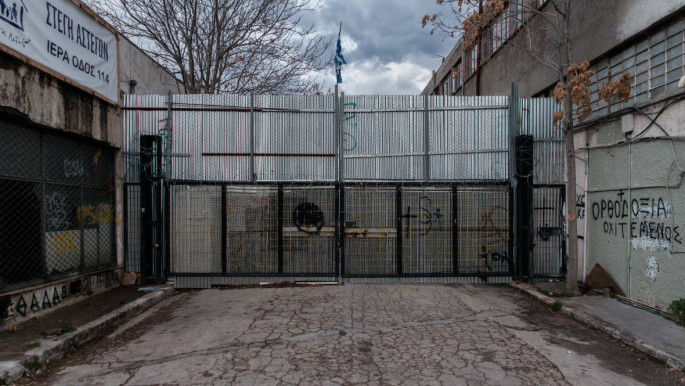 |
| The gates to the mosque construction site have been daubed with Christian Orthodox graffiti [Kostis Ntantamis] |
The patience of Muslims in finding a place in Athens where they may practice their religion may soon be rewarded. Back in August, the Greek parliament approved plans to build a mosque, and the construction work may finally be beginning.
The government foresees the allocation of 946,000 euros ($1.1m) of public money to build on land owned by the Greek navy.
"If we wish to avoid the problems facing France and Belgium, we should not make the mistakes that they are now trying to deal with," Nikos Filis, then Minister of Education, Research and Religious Affairs, stated in August.
"The existence of makeshift mosques is a shame for the country as well as for the Muslim community and a danger to national security," he added.
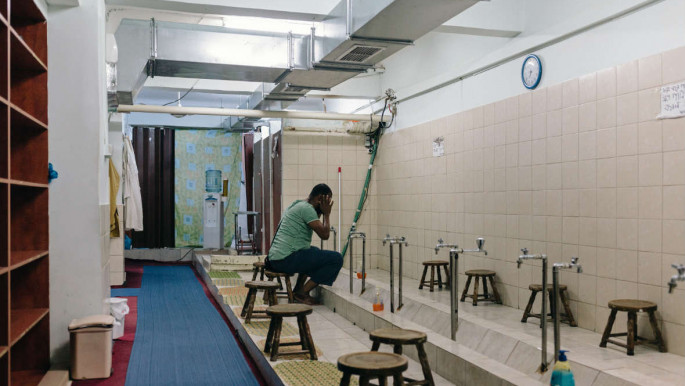 |
| Some of the 'makeshift mosques', such as this one in an abandoned warehouse, have extensive ablution facilities. Others are not so well-equipped [Kostis Ntantamis] |
The plans for a mosque in Votanikos first came into the spotlight back in 2006, when construction was initially approved by the government's inner cabinet, chaired by Prime Minister Costas Karamanlis. A decade later, it might actually happen.
"With more than 250,000 Muslims living in the Attica region alone, we finally got the impression our religion is recognised and we are accepted as equal citizens," said Naim Elghandour, the chairman of the Muslim Association of Greece.
"We believe it’s our right to pray in a decent place."
Elghandour, an Egyptian who has lived in Greece for 45 years, believes there was a political willingness to build a mosque after a new left-wing government led by Prime Minister Aleksis Tsipras took the power almost two years ago.
"It's much easier to communicate with the ministry now," he told The New Arab. Yet he continues to have his doubts. "For now we have confirmation that bulldozers entered the area. But we have fought a long fight for the first mosque to be built. I simply don't believe in it, untill I see it in front of me."
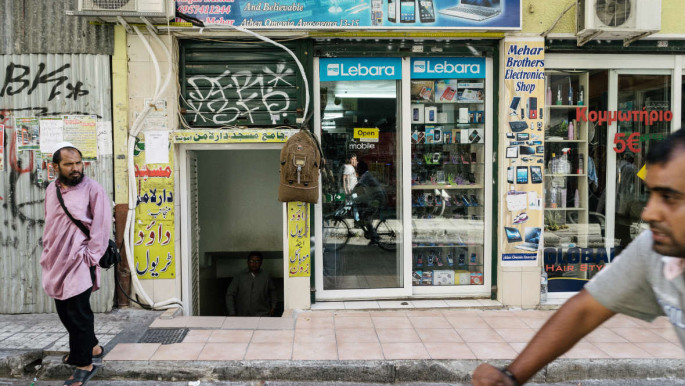 |
| Entrances to makeshift mosques in the city are often deliberately low-key, such as this one in the basement of a phone shop [Kostis Ntantamis] |
Orthodoxy above all
Not everyone here is happy about the idea of a mosque being built in Athens.
"I started to be more reserved as I believe it's not a time for such acts. We should first solve the issues of Muslims in Greece," Archbishop Hieronymus, leader of the Greek Orthodox church, told Skai TV.
"If Muslims are here to stay, it's their right to have a mosque... But what if they are only passing through the country? Why do they need a mosque?"
Even if, for years, the Greek Orthodox church - the prevailing religion of Greece - supported the construction of a mosque, now its foundations are physically being laid, signs of disapproval are coming from high officials.
"Will the mosque in Athens become another conflict zone for different Muslim groups?" the archbishop openly wondered.
And Greek orthodox officials are not the only ones opposing the mosque in Athens.
When construction plans were announced, a group of 15 men in military-style clothes immediately occupied the area, hanging Greek flags on fences and proclaiming it a "hot spot for Greeks".
Members of the nationalist far-right parliamentary party Golden Dawn and supporters of the newly established far-right group LEPEN also appeared on the scene. They announced the area would instead be renovated and dedicated to "Greek homeless".
"Sunnis and Shia are in the Middle East fighting between each other. They will bring the same war to Greece," warned Nikos Michaloliakos, the leader of Golden Dawn, the country's third most popular party, at the construction area in Votanikos.
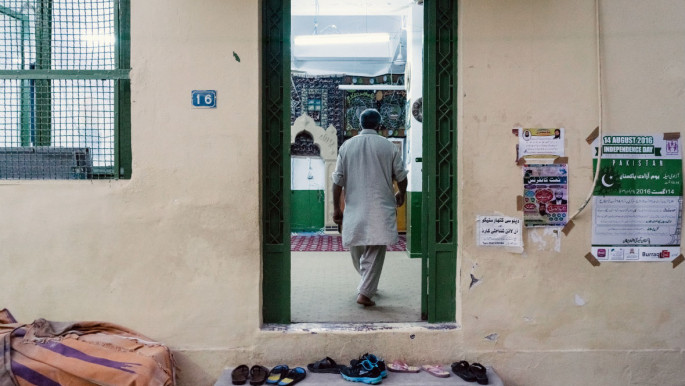 |
| Ordinary apartments have been converted to cater to the city's Muslims [Kostis Ntantamis] |
In the beginning of November police forcefully removed a group of men and detained them.
"Ten out of 15 of them had a rich criminal past. They used to be in jail. We assume someone must have paid those men to do this work," Elghandour said.
Elghandour, also a witness in an ongoing trial against Golden Dawn, said the self-proclaimed Greek fascist party had long been associated with criminality.
"For years, members of Golden Dawn or their supporters vandalised makeshift mosques in Athens," he told The New Arab. "They were writing anti-Islamic slogans on the walls, throwing the head of a pig in a mosque and threatening us: 'if you don't leave, we will slaughter you like chickens!'.
"One of the most vicious attacks happened a few years ago in Athens. When members of Golden Dawn put a lock on the doors of an underground mosque and prevented tens of Bangladeshi worshippers from leaving. Then they started throwing Molotov cocktails and wanted to burn the trapped men alive."
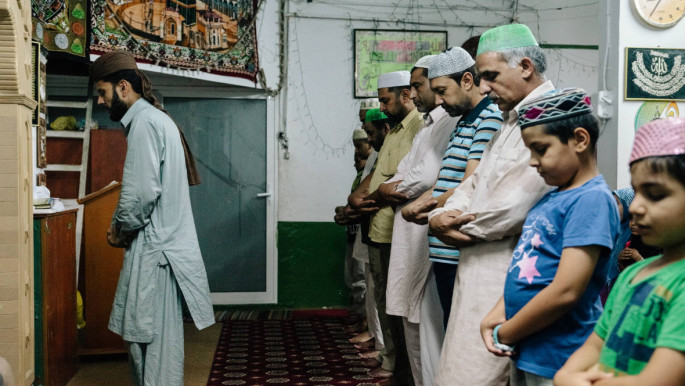 |
| Wherever worshippers gather together, prayer can be shared in community [Kostis Ntantamis] |
Forced underground
Despite the attacks on these makeshift mosques in basements, rented apartments, warehouses and garages, there is no other place where Muslims in Athens can pray together.
"We are grateful to the Greek government for giving us the opportunity to build a mosque, however for many working men, their praying routine won't change," said Imram Qasar, the imam of Dar Ul Aman, one of the makeshift mosques in Omonia in central Athens.
"We have people here from Pakistan, Bangladesh, Afghanistan and Sri Lanka. Every Friday we collect a small amount of money from each one to pay for the expenses," says the worship leader of one of the biggest makeshift mosques in Athens.
It's a little after 1pm. Men hurry to wash themselves and join their fellow worshippers. About forty gather during their lunch break for the service. This makeshift mosque is housed in a cold basement that had been an abandoned warehouse. Nicely painted walls, religious books and red patterned carpeted floor gives the mosque an authentic look.
"About 300 worshippers come here every day. Most of them because it's convenient for them as they work nearby. We will continue to operate when the new mosque is built," said Imam Qasar, himself originally from Pakistan.
The leader of the Muslim Association of Greece has a different prediction for the destiny of more than a hundred makeshift mosques after the new mosque opens.
"The ones that are far away, like Lavrio, Salamina, Piraeus, will stay. The others will be closed down. This will be at least our proposal to the ministry," Elghandour explained.
"The new mosque is reachable with public transport. I see no problem for every Muslim to attend the daily service."
Imam Qasar believes that the new mosque will be a place where Muslims will gathered for important ceremonies. "Other than that it will be accessible only for businessmen and others with cars and time. The new mosque in Votanikos will - for Muslim worshippers working in the centre of the city - be remote and unpractical."
The mosque in Athens is scheduled to be completed in April 2017.
Katja Lihtenvalner is a freelance journalist and researcher based in Athens. Follow her on Twitter: @Lihtenvalner
